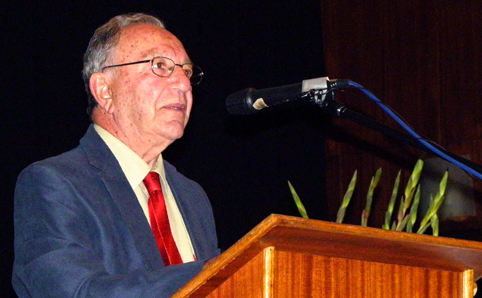Latest News Archive
Please select Category, Year, and then Month to display items
06 November 2023
|
Story MBALI MABOEA
|
Photo SUPPLIED
 The Department of Geography on the UFS Qwaqwa Campus recently played host to the Society of South African Geographers Conference (SSAG 2023), which gathered more than 100 students over three days.
The Department of Geography on the UFS Qwaqwa Campus recently played host to the Society of South African Geographers Conference (SSAG 2023), which gathered more than 100 students over three days.
Fostering academic growth, collaboration, and inspiration among students and researchers in the field of geography, the Department of Geography on the UFS Qwaqwa Campus recently played host to the Society of South African Geographers Conference (SSAG 2023), which gathered more than 100 students over three days.
Following a five-year hiatus, the three-day conference comprised student proposal presentations in different fields: human geography, environment geography, geoinformatics, and physical geography, divided into breakaway sessions over two days. Furthermore, day three of the annual conference included an excursion to the Basotho Cultural Village and Clarens.
The three-day annual student conference focused on different themes presented by two main speakers. The topic of the first keynote speaker, Dr Mahlomola Daemane, General Manager of the SANParks Arid Research Unit, focused on the contemporary conservation, transition, and relevance of science in policy and decision making.
The second keynote speaker was Dr Felicia Akinyemi, a Marie Sklodowska-Curie Research Fellow affiliated with the Institute of Geography at the University of Bern in Switzerland. Her work focuses on the intersection of geoinformatics, global change, and sustainability. Dr Akinyemi focused her talk on the integrative geospatial methods and metrics for sustainable land use. She introduced different techniques and metrics and gave students insight in early-career African research.
Speaking about the success of the conference, Nthebohiseng Sekhele, Geography Lecturer on the Qwaqwa Campus and chair of the organising committee, said, “The local organising committee was also very impressed with the quality of presentations from our postgraduate students in Geography, as well as the robust discussions that happened during the parallel sessions in the two days of the conference. We had a positive response of physical and online participation from many universities across South Africa. We are pleased that we have achieved our goal with this conference, which is to inspire the next generation of geographers.”
UFS hosts final ANC Centenary Seminar for 2011
2011-11-28
 |
|
Prof. Benjamin Turok speaking about the Evolution of Economic Policy Thinking.
Photo: Henco Myburgh
|
The African National Congress (ANC) government is faced with the dilemma of an inherited distorted economy. Subsequently South Africa has the most unequal society in the world. That is according to Prof. Benjamin Turok, head of Political Education for the ANC in Parliament. Prof. Turok spoke at an ANC Centenary Dialogue at the Bloemfontein Campus of the University of the Free State (UFS) on 23 November 2011.
Delivering the last lecture of the year in a series of dialogues about the ANC, Prof. Turok said it was hard to swallow that after 100 years there is still inequality. This for a party whose essence is the notion of sharing, as set out in the Freedom Charter. Prof. Turok told the audience in a packed Odeion Theatre that the ANC Centenary provided a moment of reflection. “If we neglect the poor and uneducated and do not interfere and direct investment, we will always have inequality.”
Talking about youth unemployment, Prof. Turok said that no society can live in peace if young people are not employed. He said that he welcomed the energy the ANC Youth League has put in economic policy, but would like to see a youth league economic policy that is scientific.
The ANC Centenary Dialogue series has been hosted by the Centre for Africa Studies and will continue on 15 February 2012.